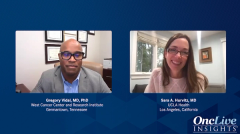
Perspectives on the Current Treatment Landscape of TNBC
Expert oncologists share insight on the prognosis of triple-negative breast cancer (TNBC) and broadly review current treatment options for patients.
Episodes in this series

Transcript:
Sara A. Hurvitz, MD:Hello, and welcome to this OncLive Insights® program on treatment approaches in triple-negative breast cancer. I'm Dr Sara Hurvitz, a breast medical oncologist at the University of California, Los Angeles. I'm pleased to discuss how we approach a patient with triple-negative breast cancer with my colleague, Dr Gregory Vidal, a medical oncologist hematologist at West Cancer Center and Research Institute in Germantown, Tennessee. Welcome, Greg.
Gregory Vidal, MD, PhD: Thank you.
Sara A. Hurvitz, MD:Let's get started. Triple-negative breast cancer actually comprises somewhere around 15% to 20% of all breast cancers diagnosed and typically is associated with a poor prognosis. There are multiple subtypes within triple-negative breast cancer itself. It is a heterogeneous entity, and it's not a very sophisticated definition that we use—calling something by what it is not. It is not hormone receptor-positive and it is not HER2-positive; thus the name is triple negative. The outcomes have been, however, described as being poorer in general. What is the general prognosis of patients diagnosed, Greg, with early-stage triple-negative breast cancer, stage for stage, compared with other subtypes? Can you give us some information on that?
Gregory Vidal, MD, PhD: Certainly. Compared with the other types, mainly the estrogen positive and the HER2 positive, as a group, triple negative usually is noted in the metastatic setting, with an average median overall survival of 18 months, which is really poor compared with the other tumor types. So, there's a lot to do in that setting.
Sara A. Hurvitz, MD:Absolutely, and we've seen treatment paradigms change, even recently. It wasn't so long ago that we really only had chemotherapy available to treat patients with any stage of triple-negative breast cancer. This subtype of breast cancer does appear to be very responsive to cytotoxic chemotherapy but paradoxically develops resistance quite quickly and can aggressively recur or progress. Can you tell us about some of the newer treatments available for our patients with triple-negative disease, maybe starting with the antibody-drug conjugates [ADCs] that we just had approved recently?
Gregory Vidal, MD, PhD: Yes, we have had some newer therapies on the market for triple negative. We still, as I said, have a lot more to do to get in line with the other subtypes. But when we're talking about new drugs, for example, sacituzumab is an anti-TROP ADC with a topoisomerase inhibitor payload that has been recently approved in the second line or greater has shown both progression-free survival and overall survival benefit. We have PARP inhibitors for BRCA mutation. It's approved for germline BRCA mutation, but we do have some phase 2 data that suggests that even in somatic BRCA mutation, we may have some activity there. We do have other drugs like pembrolizumab, which—combined with chemotherapy for PD-L1 positive or MSI [microsatellite instability]-high cancer—can also be used. You could use immune checkpoint inhibitors for TNBC and for some of the NTRK mutations to secondary breast cancer, which is not very common, but it's mainly a triple negative like those with a 95% NTRK fusion. Those drugs work very well in that context. So, we do have some new drugs on the market that are just not chemotherapy.
Sara A. Hurvitz, MD:So, our treatment regiments have become a little more sophisticated in terms of patient selection, as you mentioned. I feel like we still have a long way to go, but in the frontline setting, a patient whose tumor is PD-L1 positive by the combined positive score using the 22C3 antibody is a candidate for the use of pembrolizumab in combination with chemotherapy. Then, as you mentioned in the second line setting, sacituzumab govitecan for all patients with triple-negative breast cancer, which is better than single agent chemotherapy. I am excited to see results from ongoing clinical trials looking at other strategies, other antibody-drug conjugates, PI3-kinase pathway inhibitors for those with a PIK3CA mutation, and I think we even saw some really exciting data from the DESTINY-Breast04 study [NCT03734029] at ASCO [American Society of Clinical Oncology] 2022 that showed a small subset of patients with triple-negative breast cancer that was low-expressing for HER-2 benefited greatly from T-DXd [trastuzumab deruxtecan], so it's going to be interesting to see more data relating to that.
Transcript edited for clarity.







































